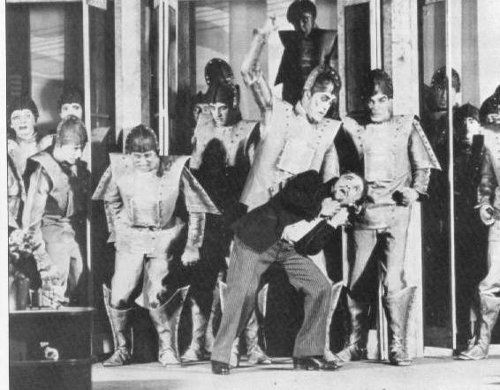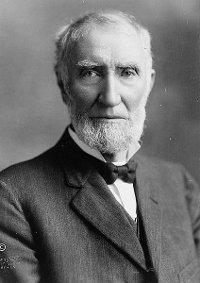brabble
v. to quarrel about trifles
Author: Greg Ross
Things to Come

DR. GALL: You see, so many Robots are being manufactured that people are becoming superfluous; man is really a survival. But that he should begin to die out, after a paltry thirty years of competition! That’s the awful part of it. You might think that nature was offended at the manufacture of the Robots. All the universities are sending in long petitions to restrict their production. Otherwise, they say, mankind will become extinct through lack of fertility. But the R.U.R. shareholders, of course, won’t hear of it. All the governments, on the other hand, are clamoring for an increase in production, to raise the standards of their armies. And all the manufacturers in the world are ordering Robots like mad.
HELENA: And has no one demanded that the manufacture should cease altogether?
DR. GALL: No one has the courage.
HELENA: Courage!
DR. GALL: People would stone him to death. You see, after all, it’s more convenient to get your work done by the Robots.
HELENA: Oh, Doctor, what’s going to become of people?
DR. GALL: God knows, Madame Helena, it looks to us scientists like the end!
— From Karel Čapek’s 1920 play R.U.R., which introduced the word robot
The Leisure Class
A sort of mania for gambling overtook White’s, a gentlemen’s club in London, in the 18th century. Excerpts from its betting book:
- “January the 14th, 1747/8. Mr. Fanshawe wagers Lord Dalkeith one guinea, that his peruke is better than his Lordship’s, to be judged of by the majority of members the next time they both shall meet.”
- “Lord Ravensworth betts Ld. Leicester & Ld. Coke ten guineas each, that the General Post Office is not three miles distant from Lord Gower’s house in Upper Brooke Street.”
- “Feb. 10th, 1748-9. Mr. Fanshawe betts Dr. Wm. Stanhope twenty guineas, that there was not a play acted at Covent Garden Play house twenty years ago.”
- “Ap. 2nd, 1761. Mr. Fanshawe wagers Mr. Gauquier one Guinea that if Mr. Harley comes to the House of Commons the first day of sitting, he comes in a red gown.”
- “Mr. Talbot bets Lord Frederick Bentinck five guineas, that destroying a horse by poison is not a capital offence by Act of Parliament.”
- “Mr. Talbot bets Mr. Blackford one guinea, that the play of Julius Cæsar is acted within six weeks from this day. Feby. 15th, 1812.”
- “Sir G. Talbot bets Sir Watkin W. Wynn five guineas, that he Sir W. does not drink a bottle of claret on French ground before the expiration of this month of March. March 6th, 1814.”
- “Col. Cooke bets Ld. Clanwilliam thirty-five guineas, that if a person understood between them ever fights a duel, he kills his man.”
In 1816 Lord Alvanley and a friend bet £3,000 as to which of two raindrops would be the first to reach the bottom of a windowpane. In a 1750 letter, Horace Walpole wrote, “They have put in the papers a good story made on White’s; a man dropped down dead at the door, was carried in; the club immediately made bets whether he was dead or not, and when they were going to bleed him, the wagerers for his death interposed, and said it would affect the fairness of the bet.”
Sightseeing

Sumter Battey’s surprisingly modern-looking “aerial machine” was patented in 1893. Essentially it’s an aluminum shell filled with hydrogen and bearing a car full of passengers and freight. The shell is fitted with adjustable wings, and the whole thing is propelled by detonating nitroglycerine pellets in the cup-shaped holder on the right, which can be swung back and forth in order to direct the vessel. “The devices for steering, as well as for causing the explosions, are fully under the control of the operator located within the car D.” What could go wrong?
Right of Way
A Moral Principle met a Material Interest on a bridge wide enough for but one.
‘Down, you base thing!’ thundered the Moral Principle, ‘and let me pass over you!’
The Material Interest merely looked in the other’s eyes without saying anything.
‘Ah,’ said the Moral Principle, hesitatingly, ‘let us draw lots to see which shall retire till the other has crossed.’
The Material Interest maintained an unbroken silence and an unwavering stare.
‘In order to avoid a conflict,’ the Moral Principle resumed, somewhat uneasily, ‘I shall myself lie down and let you walk over me.’
Then the Material Interest found a tongue, and by a strange coincidence it was its own tongue. ‘I don’t think you are very good walking,’ it said. ‘I am a little particular about what I have underfoot. Suppose you get off into the water.’
It occurred that way.
— Ambrose Bierce, Fantastic Fables, 1898
Some Palindromes

In the minuet in Haydn’s Symphony No. 47, the orchestra plays the same passage forward, then backward.
When Will Shortz challenged listeners to submit word-level palindromes to National Public Radio’s Weekend Edition Sunday in 1997, Roxanne Abrams offered the poignant Good little student does plan future, but future plan does student little good.

And Connecticut’s Oxoboxo River offers a four-way palindrome — it reads the same forward and backward both on the page and in a mirror placed horizontally above it.
Alignment

When informed of the accession of Peter III of Russia in 1762, George III said, “Well, there are now nine of us in Europe the third of our respective names”:
- George III, King of England
- Charles III, King of Spain
- Augustus III, King of Poland
- Frederick III, King of Prussia
- Charles Emanuel III, King of Sardinia
- Mustapha III, Emperor of the Turks
- Peter III, Emperor of Russia
- Francis III, Duke of Modena
- Frederick III, Duke of Saxe-Gotha
Such a coincidence was unprecedented in European history.
Unquote
“Things are not bad in themselves, but our cowardice makes them so.” — Montaigne
Heart and Soul

From a point P, drop perpendiculars to the sides of a surrounding triangle. This defines three points; connect those to make a new triangle and drop perpendiculars to its sides. If you continue in this way, the fourth triangle will be similar to the original one.
In 1947, Mary Pedoe memorialized this fact with a poem:
Begin with any point called P
(That all-too-common name for points),
Whence, on three-sided ABC
We drop, to make right-angled joints,
Three several plumb-lines, whence ’tis clear
A new triangle should appear.
A ghostly Phoenix on its nest
Brooding a chick among the ashes,
ABC bears within its breast
A younger ABC (with dashes):
A figure destined, not to burn,
But to be dropped on in its turn.
By going through these motions thrice
We fashion two triangles more,
And call them ABC (dashed twice)
And thrice bedashed, but now we score
A chick indeed! Cry gully, gully!
(One moment! I’ll explain more fully.)
The fourth triangle ABC,
Though decadently small in size,
Presents a form that perfectly
Resembles, e’en to casual eyes
Its first progenitor. They are
In strict proportion similar.
The property generalizes: Not only is the third “pedal triangle” of a triangle similar to the original triangle, but the nth “pedal n-gon” of an n-gon is similar to the original n-gon.
Abuse of Power

One hot summer day in 1904, Speaker of the House Joe Cannon of Illinois visited the House dining room and asked for a bowl of bean soup. He was told that, in view of the sultry weather, it had been omitted from the menu.
“Thunderation!” Cannon roared. “I had my mouth set for bean soup! From now on, hot or cold, rain, snow, or shine, I want it on the menu every day.”
And so it has been, ever since. The recipe was published on the menu in 1955:
2 lb. No. 1 white Michigan beans.
Cover with water and soak overnight.
Drain and re-cover with water.
Add a smoked ham hock and simmer slowly for about 4 hours until beans are cooked tender. Then add salt and pepper to suit taste.
Just before serving, bruise beans with large spoon ladle, enough to cloud. (Serves about six persons)
